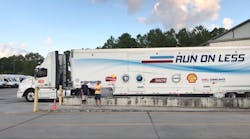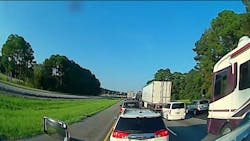Midway through their cross-country exhibition run converging on Atlanta this weekend, the Run on Less truck efficiency roadshow vehicles are seeing some impressive double-digit mpg results. But real-world conditions have factored in, demonstrating the challenges fleets face in getting optimal fuel efficiency from their trucks.
Run on Less is sponsored by Shell and PepsiCo and hosted by the North American Council for Freight Efficiency (NACFE) and Carbon War Room (CWR). Seven fleets committed trucks to participate in the roadshow, including Albert Transport, PepsiCo's Frito-Lay division, Hirschbach, Mesilla Valley Transportation, Nussbaum Transportation, Ploger Transportation and U.S. Xpress.
"This is real drivers on real routes hauling real freight," said Mike Roeth, executive director of NACFE and operations lead for Trucking Efficiency, a joint NACFE-CWR effort that studies and reports on various heavy truck fuel efficiency technologies.
The Run on Less trucks are on their normal routes and are equipped with Geotab telematics devices to stream data to the team monitoring results like vehicle speed, elevation, gallons of diesel burned and miles traveled.
"It's consistent across all seven trucks, and we're using that to populate RunOnLess.com. These are not test vehicles that have been designed specially for fuel [economy]; these are not on special tracks or anything like that," Roeth noted.
Early results
The roadshow is holding a press conference this Sunday at the North American Commercial Vehicle Show to provide results and observations from the trucks in more detail. Before then, however, Roeth said the Run on Less trucks so far have averaged 10.1 mpg, nearly 4 mpg higher than the 6.4 mpg average of all Class 8 trucks operating across the U.S. and Canada.
Over the 31,000 collective miles they'd traveled, that means the Run on Less trucks saved some 1,800 gal. of diesel fuel and about $4,500 compared with that Class 8 average.
If all those 1.7 million U.S. and Canadian trucks were as efficient as the seven in the Run on Less roadshow, "we would save 9.7 billion gal. of diesel fuel, $24 billion and 98 million tons of CO2" every year, Roeth pointed out.
Challenges
Among the Run on Less trucks, the highest daily fuel efficiency observed at this point was 12.8 mpg and the lowest was 7.4 mpg. The differences were driven by factors like the weight of the payload in the trailer, wind direction and speed, elevation and speed at which the trucks were driven.
"The last few weeks have been really challenging for moving freight around our country," Roeth noted. "With Hurricanes Harvey in the Gulf and in Texas and Irma in the Caribbean and Florida, our dependency on oil in this country has become obvious."
The hurricanes affected the Run on Less trucks, he added, with some having to alter routes, encountering problems getting fuel and experiencing high winds that affected their fuel efficiency. On that latter point, wind can be a benefit if it's coming from behind, but any other direction is a detractor.
Meanwhile, Frito Lay's snack manufacturing operations in Georgia and Florida were disrupted for many days, "challenging that particular Run on Less truck to catch up," Roeth said.
Another observation the Run on Less exhibition has noted is that the trucking industry's common "drop-and-hook" operations can have a big effect on fuel economy. A driver takes a load to its destination, drops it off and takes on another load, and the trailer that's picked up might not have the same aerodynamic and other fuel-saving technologies.
Drivers in the Run on Less lineup pointed that out. They cited trailer tails as a big loss if they switched from a trailer with one to another without; handling also isn't as good in that case, with more wind drag forming in that boxed-off, standard end of a trailer. One driver said the lack of a good trailer tail could shave off half a mpg in fuel effiency.
Trailer wheel aerodynamic fairings and dual wheels vs. "super single" wide-base tires are a few more efficiency technologies that drivers may find themselves suddenly with or without.
"From a fuel efficiency standpoint, the difference between the same tractor hauling a highly efficient trailer — one with these technologies we've talked about vs. one that doesn't — can be 10% to 15%," Roeth said.
That can make a big difference for fleets. With just that 10-15% difference, hauling a less-efficient trailer can add up to about $4,000 per year for a single truck. What's more, older trailers may also be poorly maintained.
"Maybe it has poor alignment, poor tire pressure or other things that could negatively affect fuel economy," Roeth noted. Thus even fleets equipping their trucks with the latest fuel-efficiency technologies may find reaching that optimal mpg in the real world elusive.






